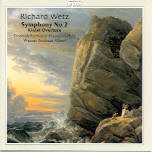Richard Wetz (1875 — 1935) was a provincial composer in the truest sense of the word, comfortably writing music in the accepted German forms, using recognizably German/Austrian melodic material, and scoring with typically German conservatism. His Second Symphony was completed in 1919, but could have been written anytime between 1880 and the early 1930s. It sounds a lot like Bruckner, Mendelssohn, Brahms and Wagner, and the most interesting thing about it is the fact that it does not include a Scherzo, but rather has two large quick(-ish) movements surrounding a brief adagio. This makes the symphony much more active than one might ordinarily expect, and its closest cousin seems to be a piece like Furtwängler’s Second Symphony, a work which also conceals some individuality of expression behind its conventional outward demeanor. Nowadays the words “conventional” and “provincial” have pejorative connotations, particularly when applied to the arts. The real issue, however, is whether or not the artist is sincere, and whether he understands how to work with the materials he chooses, however conventional they may be. Wetz knows what he is doing. His themes are attractive and well chosen, his developments imaginative, and his scoring apt. If you enjoy Bruckner, you’ll like Wetz, as least as presented here on this well played, well recorded disc.
































